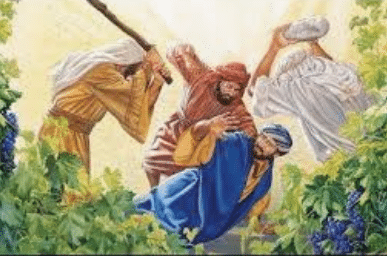— the Wicked Tenants — Esau changed the Scroll so that Jacob would perish in the Trib ; scroll restored & Jacob saved [version ; 2024-12dec.30] |
| not quite the theme ….. >> | 
|
theme : the alleged ‘parables’
… at first sight the use of parables may clarify a certain difficult theme through the
use of analogies presented in a similar situation , yet in reality they but complicate
a proper understanding of the theological subject ,
apart from the real danger that any “open interpretation” will result in the shrewdest
forcing their understanding of it upon the meeker ones as the recipe of disaster —
having seen how direct Christ spoke He would certainly not have chosen this option
in fact the ‘parables’ are Esau’s corruption-form to hide specific themes ,
by blurring the meaning and subjects so that a very clear theme has been Disarmed
under the guise of ‘some extremely spiritual message’ ;
while Esau himself admits in the by him written book ‘the quran’ that (any of the by
him written-) ‘parables’ have the effect that the wise will understand them but that the
plebs will not understand them to their own damnation : and since he wrote that book
to sustain all his corruptions in the Scroll it’s clear that ‘the parables’ are of his hand
… the only exception to the above must be when God uses analogies in order to
describe concepts in that strange Other Reality with – such as the ram being Eden ,
and the devouring animal & ‘the tall cedar’ to denote the evil region Mystery-Babylon
and her world-tree : but not after explaining the meaning of these analogies ;
however , because Christ did not speak about these concepts — since they were for
you & we to understand in prophets — there is no reason for any ‘parables’ here !
only in Revelation the same ‘animals’ return but as meant for ús to understand as an
ultimate effort of Him to point back to prophets
an indicative restored text (-only) is possible :
… because Esau sought to transform an original theme by first searching a useful
parable theme that could be projected upon the text – where we do the inverse ! –
by definition the parable-form can have forced the text in certain required aspects
depending upon the shrewdness of the chosen parable narrative ;
for this reason it’s undoable to create a fully restored text but only as indicative one
yet having followed the same method of ‘close roots’ (-with examples in the text)
which however has no less Legal weight as the restored chapters
this ‘Wicked Tenants parable’
used : Mk.12 : 1-12
mirror : Mt.21 : 33-46 & Lk.20 : 9-19
common interpretation :
… exactly as Esau intended the often used explanation is that the rude tenants
are “the people (old-) Israel” — where many stubbornly use the phrase ‘jews’ —
and that the assumed “killed servants” were God’s prophets slain by the people
that ultimately also killed the assumed “son as the heir” thought to be Christ ;
bizarre is line 10 ,
about “a stone rejected by the builders that became a corner-stone” : what this
means is anyone’s guess yet piously the stone is interpreted as Christ and the
builders as the Pharisees aka church leaders
main theme : only the restored scroll will save Jacob
… ofcourse “the son” in line 6 is about ‘the sons of Ishral’ as you & we ,
and from that point it is possible to restore the text moving backwards – so that
the previous ‘killed’ group must be “the Reformation fathers” that produced the
evil KJV that will lead most of Jacob directly into the Trib , where this same
warning also returns in what is said to the Pergamos church (‘the Reformation’) ;
start of section :
… akin to the top-pinned chapter Jeremiah 18 —
the reason for the corrupt scroll is given as the sons of Esau that wish to see
all of Jacob perish in that day : because they will not have answered God
showing in line 3 here , immediately related to the ‘declaring the scroll’ theme
[and hence line 1 came out as she did – for we needed this important concept
as introduction to the rést of the narrative] ;
the ‘scroll given’ :
… in prophets usually said to ús as “will be given to your (1500 AD-) fathers”
when said to us , but also “given to scholars” is said which we used here ;
that the other short alleged ‘parable’ about “the coin given to Caesar” must
be the same theme is not improbable since Christ must have explained this
important future theme more than once in each gospel ;
the ‘destroy the sons of Esau’ (in 11) :
… to be fair this was tricky —
in prophets ‘their desctruction’ is an integral part of the narrative but we can’t
know what He told his disciples apart from the Eden and our Originals themes ,
and perhaps He left them wondering about this context of Esau in the other
Reality — if we would make it “and they (144) will restore Eden” we run into
similar problems for it would require a background that was not meant for them
to understand ;
the ‘rejected corner stone’ :
… you see how Esau had to end his projected parable upon the text , needing
a new theme for the closing lines — after “being restored” while “the rescue of
Jacob” has NOT been concluded still , the only theme can be “witnessing”
even though not many roots match ;
closing (12) ‘is it marvellous in your eyes’ :
… though it cóuld have indicated “the wonderful rescue plan of God” we still
need ‘all of Jacob saved’ while “dwell forever in paradise” is a closing often
so used in prophets and also appropriate here because of the theme
the restored version :
… buildup runs well including the proper sequence of required themes ;
where all lines are phrased according to their mirror (-concept) in prophets
for you Sir
KJV RESTORED
[continued from a still unknown section :]
1
And + because he (God) +
he began to speak unto them had begins=commanded them (archomai=entellomai)
by + parables. in + the former days (parabole=proteron)
a vineyard + to say=declare [+his] scroll [+unto him]
was planted + by a [certain] man, so that he would bless + the people ; (?)
and + but now ,
he set + an hedge (-about it), it has became + the sealed one , (phragmos=sphragizô)
and digged [a place for] + though he vat=warned [+them] + (hupolénion=hypodeiknymi)
the winefat , [+through his] prophets (peritithémi=prophêtês)
and built a tower, that the enemy would capture (-it) + (purgos=echthros)
and let it out to + and change the it=scroll of + (auton=biblion)
husbandmen, the words + (geórgos=logos)
and + [=travelled] ; which + he spoke ;
2
And at the season he sent + as the to=sons of Esau that would say : (pros=yhios)
to the husbandmen + a servant, in the time of the + end (doulos=eschatos)
that [+beside] he might + his beside=wrath + (para=par-orgismos)
receive from the husbandmen of + will make to perish [+his] people + (lambanó=apollymi)
the fruit of + the vineyard. in the great tribulation ; + (karpos=magas) (+8-b)
3
And they caught [him] , for they will not have answered him (apostelló=apokrisis)
and beat him, [+concerning his] (eden-) covenant (deró=diathêke)
and + sent [him] away + empty which he spoke in the scroll (kenon=biblion)
4
And again he sent unto them + therefore he will send unto scholars + [‘Reformation’]
another servant; angels [+with] the scroll
and-that-one that by the evil-doing of + (5-b) (kakeinos=kakopoieô)
(they cast + stones) , the sons of + Esau (lithos=yhios +)
and (wounded [him] + in the head) , had become the corrupt one , (kephalé=kapêleuô)
and sent [him] away + and they will and=not truthfully (?) +
shamefully handled. restore [+him] : (atimazô=katartizô)
5
And again + he sent + another; for they will not listen to another=God
(b) and-that-one + they killed, and will produce + the wicked one (KJV) (kakeinos=kakos)
and many others; + that will beat=lead + many + (deró=hodêgeô)
indeed + beating + some, into the days of the others=tribulation (allos=thlipsis)
and killing some. in which they will be killed ;
6
Having yet therefore one + wherefore one=God will raise up +
son, the sons of + [‘you & we’]
his + wellbeloved, the remnant of + Ishral (‘144’) (agapétos=hypoleimma)
he sent him also last unto them, and send the scroll unto them ,
saying, that for they will restore that=him
They will reverence + my + son by understanding his son=words ; (yhios=logos)
7
But those + husbandmen + yet the pastors + and prophets +
said among themselves, will say about them :
that + This + is + the heir; the sons do evil to the heir=scroll ,
come, let us kill him, [+therefore] come=God will judge them ;
and the inheritance + but the judgment + (kléronomia=krima):
shall be + ours will be [+upon] themselves ; .
8
And they took because then I will come
him, + [and] killed [him] , to gather + the him=remnant (‘144’)
and cast [him] + as the ones that will delivered
(b) out of the vineyard ; before the tribulation . + (ampelônos=thlipsis)
11
What shall then the lord of + and when the Father
the vineyard + do? will have restored [+them] in [+their] sacred ones ,
he will come + and + as his come=army +
destroy the husbandmen, they will destroy the [+sons of] farmers=Esau ; [intro]
and + after which +
will give + the vineyard + unto others. he will send the remnant unto earth ; +
10
And have ye not read this scripture; because he spoke this in the scroll : [intro]
The stone + which the builders rejected I will rescue Jacob out of the tribulation (lithos=thlipsis)
this + is become + when the remnant has witnessed [+of me] +
into + the head of + the corner: unto their + people ;
11
This was the Lord’s + and this he become=promised + (ginomai=epangelia)
doing [‘become’] , unto [+his] lord=people , (kurios=démos)
and it is + marvellous + that they will dwell + forever (thaumaste=pantote)
in + our eyes ? in his paradise . (ophthalmos=paradeisos)
